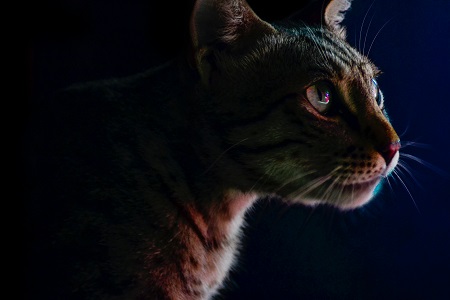Cats may or may not learn from their mistakes. Like any other animal, cats don’t have intelligence like that of humans. Thus, while they can thrive on instinct, cats have no idea if they’re doing right or wrong. They can’t tell a mistake from a good deed and will continue to act on instinct. Even so, it doesn’t mean they can’t learn. As owners, you can do something to make your pet cats learn from their mistakes.
Having kitties as pets holds a lot of good things. While they can’t learn from their own mistakes, you can guide them to do so.
Let’s understand them a little deeper.
Contents
Do cats know when they did something wrong?
Do cats know when they did something wrong?
As stated above, cats, like any other animals, cannot distinguish if their actions are good or bad.
Like animals, they also act on instinct, unlike humans, who can think first before doing something.
Your pet may be stealing food in your eyes. But, to your pet, it just saw free food to consume.
Your cat may hurt you in your eyes. But to your pet, it’s just kneading to express comfort, ease, and love.
Felines are fascinating pets. While they don’t know they’re making mistakes, they can learn through constant guidance.
By guidance, I mean by teaching them and letting them know they made a mistake.
Unlike humans, cats and other pets need training and guidance to learn.
To simply put it, they may not learn from their mistake, but you can make them know by showing its harmful effect.
There are specific ways to do it, and it will train your pet to refrain from doing the things it shouldn’t do.
If you’d get mad, will your pet be able to understand it?
Related – Why doesn’t my cat like me anymore?
Do cats understand when you are mad at them?

While cats may not distinguish their actions, they can understand when you are mad at them about it.
What makes felines fascinating pets is that they pay attention to their owner’s emotions.
According to a study, felines show different behaviors when their owner smiles at them. Further, they pay much more attention to a positive attitude rather than a negative one.
Thus, even though it has a lesser effect, your pet will understand you frowning at it in response to its action.
The best thing about this fact is that as your feline friend gets closer to you, it’ll sense and respond more to you.
Still, it’s quite essential to note that your kitty will be more adept to a smile than a frown.
Now, what does it mean, and how can it affect your goal of making your cat learn from its mistake?
You May Also Read – Do cats know when you are dying?
How to make cats learn from their mistakes?
Based on the study above, I made three tips you can use to make cats learn from their mistakes.
Encourage and appreciate their good behavior
As the study above shows, cats pay more attention to a smile than a frown.
Thus, if you want your feline pet to learn from its mistake, start by appreciating its good behavior.
Give a treat every time it behaves and does no harm. That way, your pet will tend to keep on doing the things that give it treats.
Smile at your pet every time it does something right. A positive reaction will train it to do the things you’d like it to do.
Discourage bad behavior but never punish by hurting
Training your cat to learn from its mistake means discouraging lousy behavior at the same time.
Reminder: Never punish by hurting your cat.
Indeed, you need to discourage bad behavior but never do so through punishing physically.
Punishment such as hitting and kicking will take a significant toll on your pet. When you hit your feline pet, it may:
- Get hurt and injured.
- Fight back in self-defense and may hurt you more.
- Show more bad behavior.
- Turn away from you and lose affection towards you.
Physical hurting destroys the purpose of why you even considered taking it as a pet. Discipline is essential, but the bodily injury is not the ideal form of it.
There are three things you can do to show your discouragement. You could:
1. Ignore your cat
Since felines like it when you pay attention, they may not like it when you ignore them. They may even see shouting as a form of getting your attention and may continue doing their wrong actions.
2. Frown at your cat
Frowning is a simple gesture of annoyance and irritation, and your pet will sense this as a bad thing. Thus, frowning will teach it to refrain from doing it.
3. Take away the treats
If you’re giving your cats treat every time they do good, take it away when they do bad. They would do anything to get what they want. Thus, if they don’t receive treats from doing a sure thing, they’ll stop it eventually.
Always watch out for your cat
By keeping an eye on your pet, you can understand its behavior and actions.
A keen observation will help you learn what they prefer and what they don’t.
At the same time, it will help you prevent if there’s something they’re about to do that you don’t want.
Lastly, the act of watching your pet is part of your responsibility as the owner. Thus, doing it will prove how much you care for your pet.
Find out why your cat doesn’t recognize you in our article.
Can cats learn from each other?
If you have two or more cats in the house, it can provide a big help since they can learn from each other.
Felines are quite observant, and they can watch the behavior of their fellow animals. If you’re introducing a new one, it might learn the things from your old feline pet.
Always be on the lookout, though, to ensure that both pets behave according to how you want.
In Summary
Cats may not learn from their mistake the way we humans do, but they know through their owners.
Thus, it shows a responsibility that every owner needs to do. Your pet may not know a good deed from a bad one, but you can always teach and show them.
It’s also a great way to interact with your pet. You’re not only making it learn from its mistake.
More than anything, you’re also doing your job as its owner.
Resources
Study – Domestic cats and their discrimination of human emotion cues
Image credits – Photos by Fu Yonghua and MAKM Photography on Unsplash



